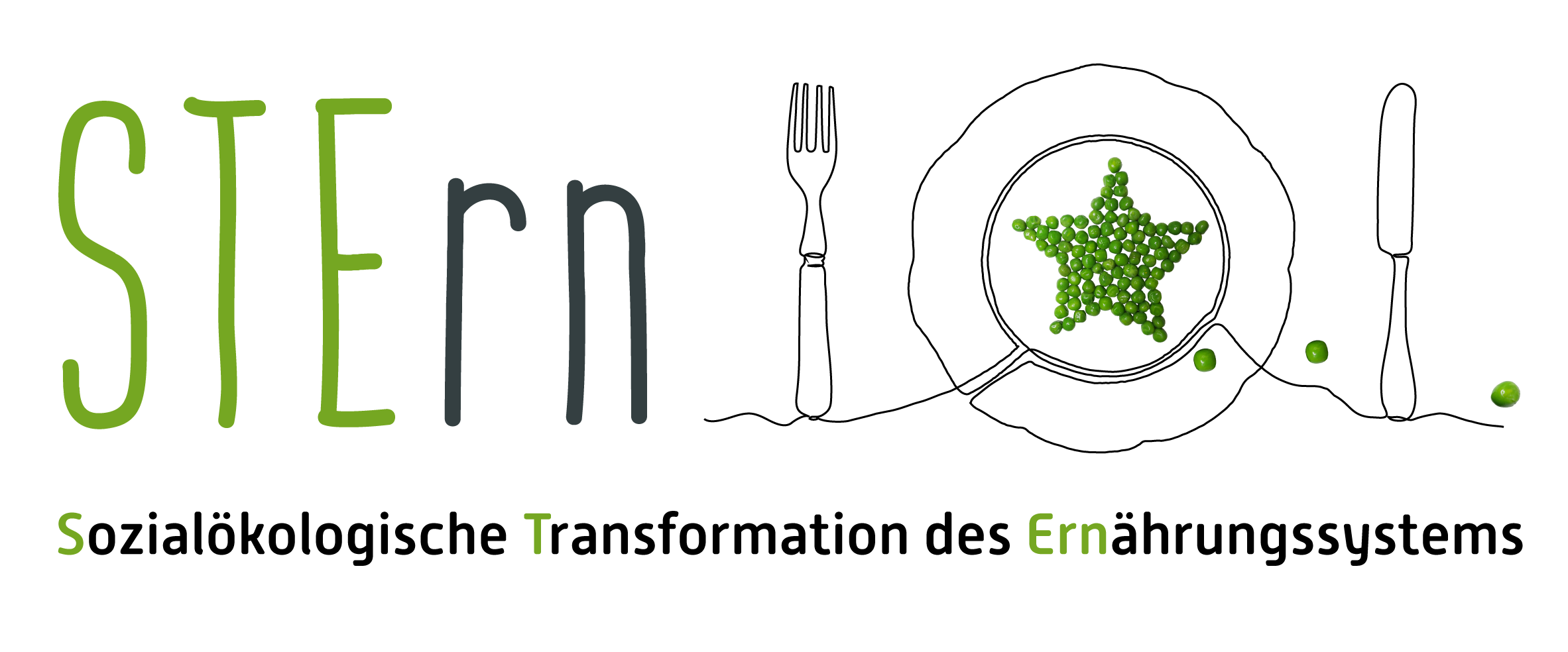Goals
Within the project „Socio-ecological Transformation of the Food System“, policy recommendations for the transformation towards a sustainable food system were developed between October 2020 and September 2023. The recommendations include short-, medium- and long-term courses of political action. The acronym STErn (meaning „STAR“) is based on the German name of the project „Sozial-ökologische Transformation des Ernährungssystems“.
The focus is on three topics:
- Plant-based diet: Suitable aggregated indicators and target values for measuring progress were determined, effective political interventions were identified, and selected approaches were explored in depth. Based on this, political entry points to promote a more plant-centric diet in Germany were developed.
- Organic food and farming sector: Scenarios and development concepts for the organic food and farming sector were elaborated, which not only target agricultural production but encompass the entire value chain. Based on this, recommendations for action were derived for policy-makers, scientists, and practitioners.
- Regionalization: The relevance of environmental policy regarding the regionalization of food was examined. For this purpose, the potential effects of a stronger regionalization of food production in Germany were analyzed. Based on this, political entry points to promote the regionalization of the food system in Germany were developed.
As a cross-cutting issue, the role of the financial sector in the transformation of the food system was analyzed . Based on this, proposals for determining sustainable investments in the food sector as well as suggestions for improved financing of sustainable regional production and processing concepts were developed.
The development of political recommendations was carried out in close dialogue with relevant actors in Germany, who were involved through interviews and workshops.
Background
Food systems around the world have changed dramatically in recent decades. During the so-called "Green Revolution" of the 1960s, new technologies and practices proliferated - such as the use of high-yielding varieties, artificial irrigation, mineral fertilizers, and pesticides. As a result, global food production increased sharply.
However, the high intensification also comes with serious social and environmental consequences. In addition, there are increasing pressures on natural resources and ecosystems from a growing world population, rising demand for agricultural products outside the food sector, changing dietary patterns towards more resource-intensive animal foods and highly processed products, and changing consumption patterns towards more resource-intensive animal foods and highly processed products. In this context, nutrition-related diseases are also increasing at an alarming rate.
One reason for the negative social consequences of the food system is that the environmental and social costs of the current food system are not always reflected in the price of food. This means that, while food prices have fallen over the years, this is also due to the socialization or externalization of the true costs. This, in turn, creates unfair competitive conditions in the food market from a sustainability perspective, economic damage, and ethical problems, which are reflected in the health system, the strain on natural resources, the loss of pollinators, animal suffering, and food waste.
The COVID-19 pandemic further highlighted some of the problems of the current food system. These include the vulnerability of concentrated production and processing structures to crises, as well as precarious working conditions. It also underscores the importance of intact natural habitats for the environment and human health, as the risk of pathogens being transmitted from animals to humans increases with the destruction of natural animal habitats. One of the key drivers of natural habitat destruction is the expansion of land-intensive livestock farming and, ultimately, the overconsumption of animal-based foods in many countries.
In recent years, political impulses have been sent out: The need for a socio-ecological transformation of the food system is expressed, for example, in the European "Farm to Fork Strategy" of 2020. The task now is to create political framework conditions that do justice to the complexity of the socio-ecological challenges. So far, this has not been done to a sufficient extent: Food policy issues (agriculture, environment, health, food security, economic development, etc.) are fragmented into different departments and do not follow a coherent strategy. For instance, agricultural policy support does not follow an overarching approach that considers everything from agricultural production through trade and consumption to disposal/recycling. In addition, important sub-areas of the transformation of food systems - such as the promotion of plant-based diets - are not yet consistently on the political agenda.
Moving forward, it is essential to consistently align sustainability policies. This requires coherent recommendations for policymakers, including appropriate tools, transparent indicators, and improved participation processes. Currently, science-based insights are lacking in some key areas. This is where the STErn project comes into play.
